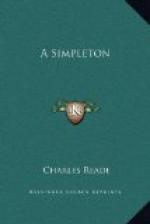It was in this spirit she now forced herself to keep accounts. No fear of her wearing stays now; no powder; no trimmings; no waste.
After the usual delay, her father told her she should instruct a solicitor to apply to the insurance company for the six thousand pounds. She refused with a burst of agony. “The price of his life,” she screamed. “Never! I’d live on bread and water sooner than touch that vile money.”
Her father remonstrated gently. But she was immovable. “No. It would be like consenting to his death.”
Then Uncle Philip was sent for.
He set her child on her knee; and gave her a pen. “Come,” said he, sternly, “be a woman, and do your duty to little Christie.”
She kissed the boy, cried, and did her duty meekly. But when the money was brought her, she flew to Uncle Philip, and said, “There! there!” and threw it all before him, and cried as if her heart would break. He waited patiently, and asked her what he was to do with all that: invest it?
“Yes, yes; for my little Christie.”
“And pay you the interest quarterly.”
“Oh, no, no. Dribble us out a little as we want it. That is the way to be truly kind to a simpleton. I hate that word.”
“And suppose I run off with it? Such confiding geese as you corrupt a man.”
“I shall never corrupt you. Crusty people are the soul of honor.”
“Crusty people!” cried Philip, affecting amazement. “What are they?”
She bit her lip and colored a little; but answered adroitly, “They are people that pretend not to have good hearts, but have the best in the world; far better ones than your smooth ones: that’s crusty people.”
“Very well,” said Philip; “and I’ll tell you what simpletons are. They are little transparent-looking creatures that look shallow, but are as deep as Old Nick, and make you love them in spite of your judgment. They are the most artful of their sex; for they always achieve its great object, to be loved—the very thing that clever women sometimes fail in.”
“Well, and if we are not to be loved, why live at all—such useless things as I am?” said Rosa simply.
So Philip took charge of her money, and agreed to help her save money for her little Christopher. Poverty should never destroy him, as it had his father.
As months rolled on, she crept out into public a little; but always on foot, and a very little way from home.
Youth and sober life gradually restored her strength, but not her color, nor her buoyancy.
Yet she was perhaps more beautiful than ever; for a holy sorrow chastened and sublimed her features: it was now a sweet, angelic, pensive beauty, that interested every feeling person at a glance.
She would visit no one; but a twelvemonth after her bereavement, she received a few chosen visitors.
One day a young gentleman called, and sent up his card, “Lord Tadcaster,” with a note from Lady Cicely Treherne, full of kindly feeling. Uncle Philip had reconciled her to Lady Cicely; but they had never met.




